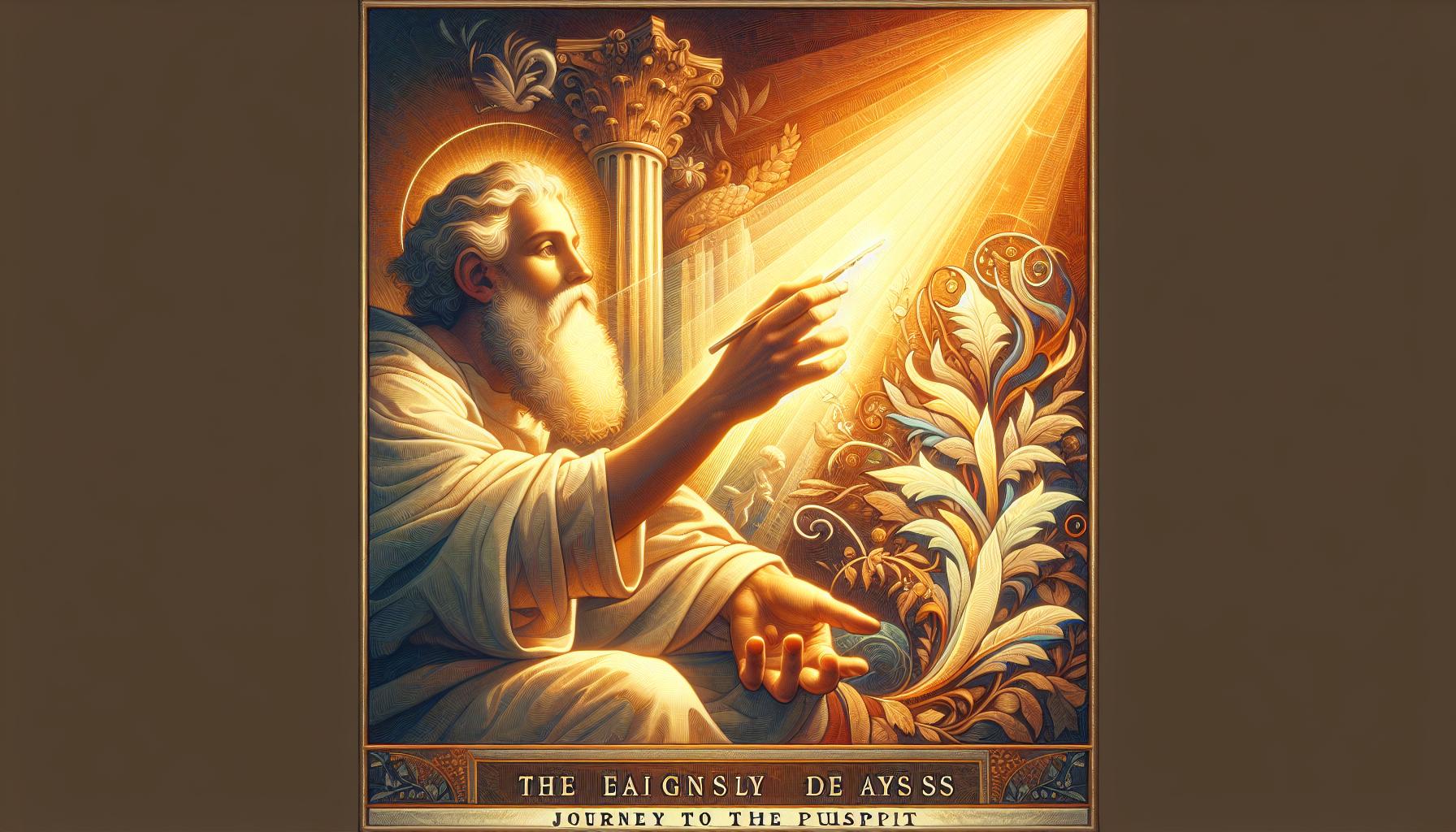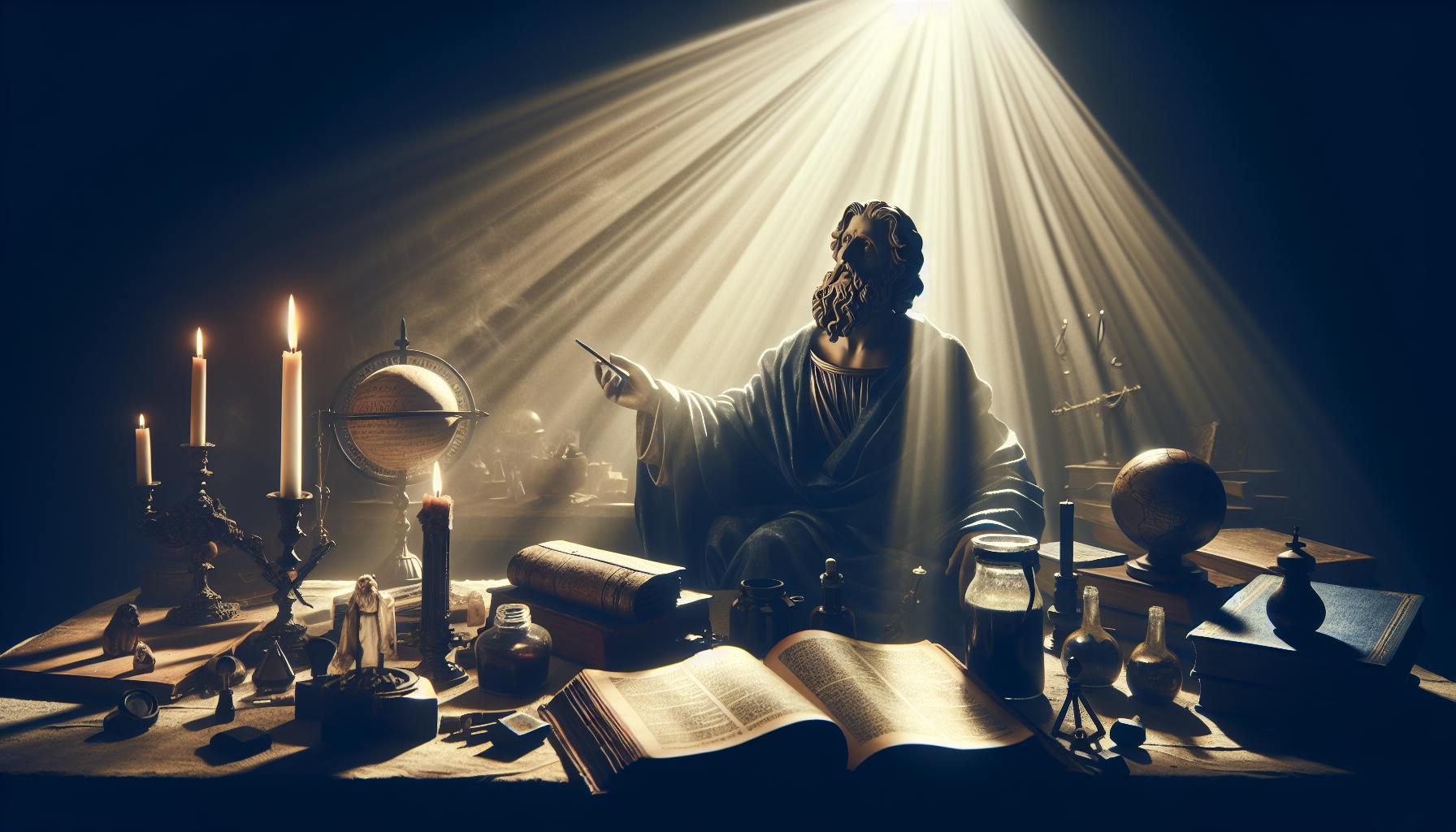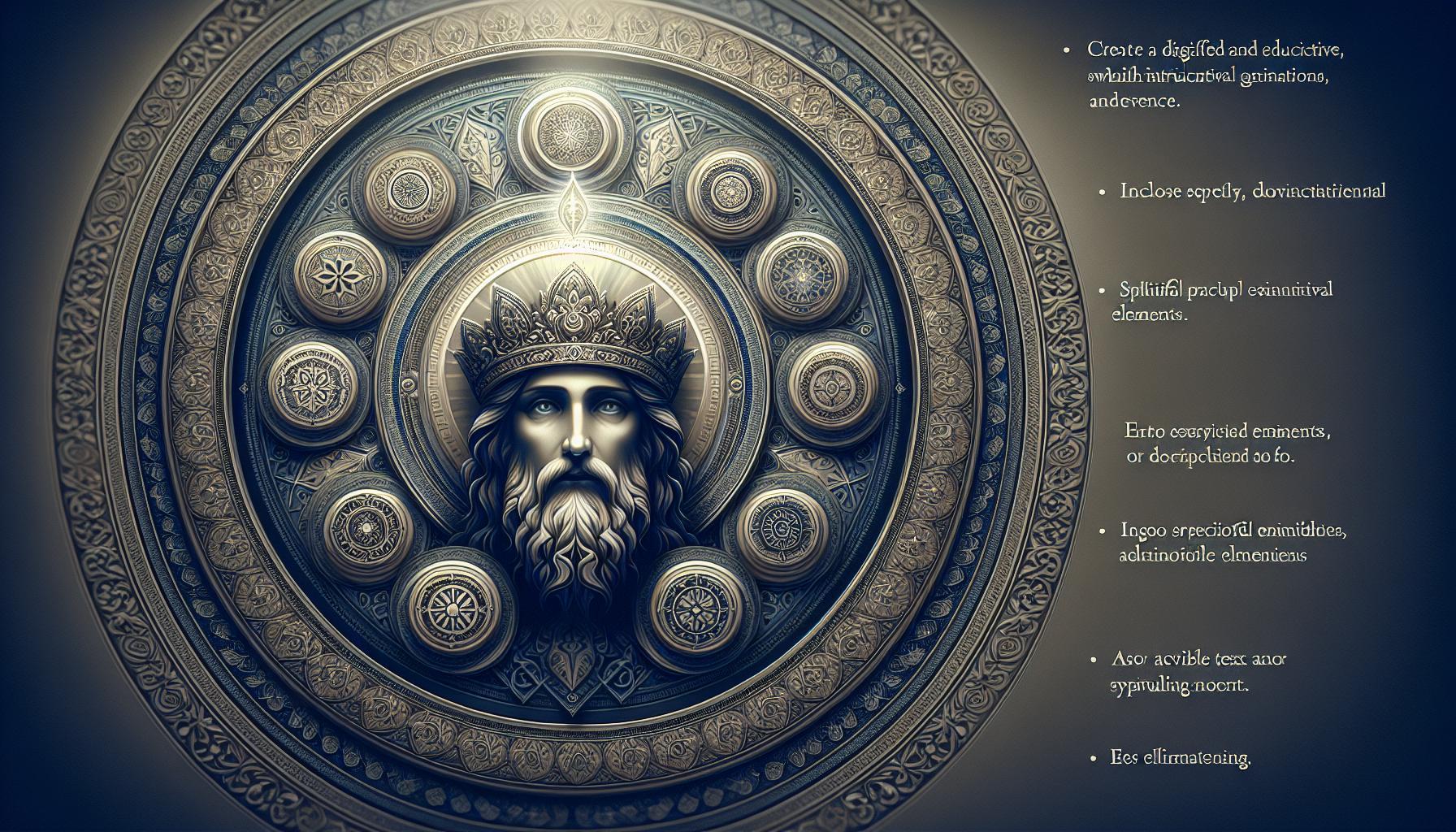At what point did Martin Luther King Jr. transform from a young preacher into a pivotal leader of the civil rights movement? Understanding the inception of his preaching career is crucial, as it laid the spiritual and moral groundwork for his advocacy against racial injustice. This exploration reveals how his early sermons shaped a generation and fueled a movement for equality.
The Early Days: Martin Luther King Jr.’s Journey to the Pulpit
From an early age, Martin Luther King Jr. was surrounded by the powerful echoes of the Southern Baptist tradition, a cornerstone of his community and identity. Born on January 15, 1929, in Atlanta, Georgia, King’s upbringing was marked by the influential presence of his father, Martin Luther King Sr., who served as a pastor at the Ebenezer Baptist Church. This environment not only nurtured his spiritual growth but also instilled a deep understanding of the social injustices prevalent in American society, which would later inspire his journey into the civil rights movement and ultimately lead him to the pulpit.
King’s foray into preaching can be traced back to his formative years, where oratory skills and a gift for persuasion began to surface. His first official preaching engagement occurred while he was still a young man in seminary, demonstrating his passion for both religion and social justice. The pivotal moment that cemented his path was during his studies at Crozer Theological Seminary in Pennsylvania, where he became deeply influenced by the teachings of Gandhi, social theory, and theological perspectives that emphasized love and nonviolence as tools for social change.
Educational Influence
During this time, King honed his skills through various avenues of learning and engagement, focusing on the intersection of faith and activism. His academic achievements and speeches garnered attention, laying the groundwork for his later work in the civil rights movement. The outreach efforts and community engagement projects he participated in during these years further amplified his resolve to address issues of racial inequality.
- 1948: Attained a Bachelor of Arts degree in Sociology from Morehouse College.
- 1951: Enrolled at Crozer Theological Seminary.
- 1955: Earned a Ph.D. in systematic theology from Boston University, equipping him with profound insights into engage with both biblical texts and contemporary social issues.
By the time King began his pastorship at the Dexter Avenue Baptist Church in Montgomery, Alabama, in 1954, he was already a well-rounded scholar and passionate advocate for civil rights. It was during this pivotal stint that his profound oratory skills would turn sermons into mobilizing actions, challenging the status quo and inspiring those who sought change. His preaching was not merely a spiritual exercise; it was a vigorous call to action, urging followers to embrace nonviolent resistance as a means to confront oppression, embodying the spirit of what would soon become a widespread civil rights movement.
This engagement with faith revealed the answering question of when did Martin Luther King Jr. start preaching: his role as a civil rights pulpit leader was deeply intertwined with his early experiences, education, and the profound legacy of faith that shaped his vision for equality and justice. Through the lens of his church leadership, King was able to transform religious gatherings into fervent rallies for social justice, making it clear that his journey was as much about spiritual salvation as it was about the liberation of the oppressed.
The Impact of Education on King’s Preaching Style
Martin Luther King Jr.’s profound ability to captivate and inspire audiences through his sermons emerged from a combination of his background, education, and experience. His journey into preaching began during his formative years, and the impact of his educational experience was fundamental in shaping his distinctive style. From the classrooms of Morehouse College to the hallowed halls of Boston University, King absorbed diverse theological perspectives, philosophical arguments, and rhetorical techniques, which ultimately infused his messages with depth and fervor.
Educational Foundations
King’s academic pursuits significantly influenced both the content and delivery of his sermons. At Morehouse College, he was trained in the traditions of Christian education, where he learned to understand and articulate complex theological principles. Additionally, his exposure to social justice themes fueled his passion for civil rights. The education King received equipped him with:
- Theological Knowledge: Understanding of complex biblical and moral frameworks.
- Rhetorical Skills: Techniques for persuasive speech that moved audiences to action.
- Philosophical Insights: The ability to articulate the relationship between faith and social justice.
Diverse Influences
During his time at Boston University, where he earned his doctorate in systematic theology, King encountered various philosophies that broadened his worldview. The study of figures like Mahatma Gandhi profoundly affected his preaching style, incorporating nonviolent resistance as central to his sermons. This synthesis of ideas allowed King to transcend traditional Baptist preaching, imbuing his messages with a universal appeal aimed at varied audiences.
To illustrate the variety of influences on King’s preaching style, the table below summarizes key educational milestones alongside notable mentors and their contributions:
| Institution | Key Focus | Influence on Preaching |
|---|---|---|
| Morehouse College | Theology & Social Justice | Foundation for integrating faith and activism |
| Boston University | Systematic Theology | Development of a comprehensive moral framework |
Incorporating diverse influences and educational principles, King utilized a powerful narrative style characterized by emotional resonance and intellectual rigor. This duality made his sermons not just messages of faith but calls to action that inspired movements. King’s unique approach to preaching not only drew people into the church but also pushed them toward a more profound engagement with the civil rights struggle, demonstrating the transformative power of education on his preaching style.
Theology and Activism: King’s Sermonic Approach to Civil Rights
In the evolving landscape of civil rights, few figures have wielded the power of the pulpit as effectively as Martin Luther King Jr. From his early days preaching in the Southern Christian Leadership Conference (SCLC) to his later renowned discourse at mass gatherings, King’s sermons were not just religious messages; they were clarion calls for social justice. As he navigated the tides of a turbulent era, King’s theological underpinning merged seamlessly with his activism, creating a unique blueprint for change that resonated across racial and cultural divides.
The Theology of Nonviolence
At the heart of King’s sermonizing was a profound commitment to nonviolence, rooted in scripture and the teachings of Jesus Christ. He emphasized love and forgiveness, believing that they were not merely moral choices but vital strategies for achieving social justice. This was especially evident in his “I Have a Dream” speech, which invoked biblical themes to illustrate his vision of a racially harmonious America. By employing familiar religious rhetoric, he was able to galvanize support from diverse audiences, thus bridging the gap between faith and action:
- Spiritual Conviction: King often referenced the importance of faith in overcoming adversity, encouraging his followers to remain steadfast in their beliefs.
- Community Engagement: His sermons functioned as a means to unite disparate community groups under a shared moral vision, fostering solidarity in the struggle for civil rights.
- Transformational Action: King believed in the power of love to transform societal structures; his messages called for active participation in the civil rights movement through peaceful demonstrations and advocacy.
Examples of King’s Activist Preaching
Through his eloquent sermons, King articulated a theology that was socially aware and action-oriented. Notable instances include his sermon at the 1963 National Cathedral, where he articulated a divine mandate to pursue justice, highlighting that faith must manifest itself through action. King also preached during significant events such as the Montgomery Bus Boycott and the Selma to Montgomery marches, using these platforms not only to inspire but also to instruct his followers on the principles of civil disobedience and the importance of civic engagement.
| Event | Key Sermon Theme | Takeaway |
|---|---|---|
| Montgomery Bus Boycott | Faith in Action | Collective action can lead to systemic change. |
| March on Washington | Justice and Equality | A vision for a racially integrated society grounded in equality. |
| Selma to Montgomery March | Nonviolent Resistance | The power of peace in the face of oppression. |
In essence, Martin Luther King Jr’s preaching was a revolutionary act that challenged the status quo while invoking deep spiritual convictions. His ability to weave theological insights into a framework for social activism not only transformed the civil rights movement but also provided a lasting legacy for future generations. Through his sermons, he demonstrated that the church could be a powerful force for social change, encouraging individuals to take up the mantle of responsibility and advocate for justice.
Notable Sermons that Shaped a Movement
The power of a sermon lies not just in the words spoken, but in the ability to stir souls and incite action. Martin Luther King Jr. harnessed this potential through his remarkable gift of oration, delivering messages that weren’t merely sermons but powerful calls-to-action that galvanized a nation. His role as a preacher emerged around the mid-1950s, coinciding with the burgeoning Civil Rights Movement. Here, we explore some of his most notable sermons that propelled this pivotal movement forward.
The Drum Major Instinct
One of King’s most influential sermons, delivered on February 4, 1968, at Ebenezer Baptist Church in Atlanta, Georgia, was “The Drum Major Instinct.” In this powerful address, King discussed the human desire for recognition and how it can be transformed into a force for good. He emphasized that true greatness is not defined by what one gains for oneself but by what one does for others.
- Key Ideas: Selflessness, service to others, and the importance of community.
- Impact: This sermon laid the groundwork for discussions on altruism and leadership within the civil rights context.
I Have a Dream
While many associate the “I Have a Dream” speech with the monumental March on Washington in 1963, it’s essential to note that King’s preaching style was integral to its impact. He infused biblical references and resonant emotional appeals that called the audience to envision a future free from segregation and oppression.
| Element | Description |
|---|---|
| Biblical Imagery | References to scripture that connected the struggle for civil rights with divine justice. |
| Emotional Appeals | Use of passionate language to evoke empathy and hope. |
| Visionary Future | Painting a picture of a united society, which resonated deeply with listeners. |
Letter from Birmingham Jail Sermon
Although not a sermon in the traditional sense, King’s “Letter from Birmingham Jail” served as an extended message that articulated moral justifications for nonviolent protest. Written in April 1963, it defended the strategy of nonviolent civil disobedience in the face of unjust laws. The letter articulated a philosophy that resonated deeply with both clergy and laypeople alike, addressing the need for urgent action.
- Enduring Relevance: This letter continues to inspire activists today, exemplifying the importance of moral frameworks in social justice movements.
- Call to Action: King’s arguments underscore what it means to confront injustice with ethical clarity and determination.
King’s sermons were not merely chances to impart religious teachings; they were profound declarations of hope, justice, and the recommitment to civil rights. They shaped a movement and encouraged countless individuals to rise up against injustice through love and understanding. Each message carries the weight of urgency, emphasizing that the pursuit of civil rights is an ongoing journey that requires active participation from all members of society.
The Role of the Church in King’s Civil Rights Activism
Martin Luther King Jr.’s impact on the Civil Rights Movement was not solely due to his charismatic leadership or powerful speeches; it was also deeply intertwined with the church’s active involvement in advocating for social justice. The church served as a pivotal platform for King’s activism, providing both spiritual sustenance and a powerful outlet for organizing community efforts. From the very start of his ministry, King viewed the church as a necessary institution for inciting change, thus shaping his approach to civil rights.
The Church as a Catalyst for Change
King’s preaching was rooted in the belief that faith and morality were essential in the struggle for equality. The church was a natural venue for him, where he could harness its influence to galvanize support among African Americans and sympathetic white allies. Within the walls of the church, King spoke about the ideals of love, justice, and nonviolent resistance, drawing from both biblical teachings and contemporary philosophies, notably the principles of Mahatma Gandhi.
- Community Mobilization: The church facilitated the mobilization of community members, serving as a meeting place for organizing protests, marches, and sit-ins.
- Financial Support: Many churches provided funding for civil rights activities, allowing initiatives to flourish without crippling participants financially.
- Education and Awareness: Sermons often included discussions on civil rights issues, raising awareness among congregants and inspiring them to take action.
Unified Voice of Resistance
King’s role as a pastor allowed him to communicate effectively with individuals from diverse backgrounds, making him a unifying figure. His sermons often addressed the urgency of civil rights, framing the struggle as not only a political battle but as a moral imperative. The church’s multi-layered community networks helped spread his messages widely, creating a powerful voice for the movement.
| Influence of Church on King’s Activism | Description |
|---|---|
| Spiritual Foundation | The church provided a moral compass to advocate for justice and equality. |
| Organizational Support | Enabled large-scale events like the Montgomery Bus Boycott and the Selma marches. |
| Network Expansion | Facilitated connections between activists nationwide, promoting solidarity. |
In summary, King’s work was profoundly marked by the church’s involvement in civil rights activism. Beginning with his early days as a preacher, he adeptly utilized this platform to foster community engagement, mobilize resources, and advocate passionately for the dismantling of racial injustice. The legacy of this integration shows how faith can be a potent force for social change, illustrating the strong link between spirituality and the quest for human rights.
How King’s Preaching Addressed Social Justice and Faith
Martin Luther King Jr. emerged as a pivotal voice during the civil rights movement, and his sermons became a powerful tool for addressing the intersection of social justice and faith. His ability to intertwine profound theological principles with pressing societal issues resonated deeply within African American communities and beyond. King utilized his pulpit not just as a space for spiritual encouragement, but also as a platform to challenge systemic racism, economic inequality, and social injustice.
Theological Foundations of Social Justice
King’s preaching often drew upon his understanding of Christian love, which he referred to as *agape*. This concept transcends mere affection and encompasses a selfless love that seeks justice and equality for all. In his sermons, King emphasized:
- The necessity of unity among people of faith.
- God’s call to actively work against injustice.
- The moral imperative to uphold the dignity of every human being.
By framing civil rights as a moral and spiritual issue, he inspired his congregation and allies to see their struggle as not just a political movement but as an extension of their faith. His memorable phrases, like “Injustice anywhere is a threat to justice everywhere,” urged believers to act on their faith and engage in the fight for social change.
Practical Applications of Faith in Action
King’s teachings were deeply practical; they provided a roadmap for individuals looking to make a difference in society. Through his sermons, he encouraged active participation in nonviolent protest, community organizing, and grassroots activism. His emphasis on peaceful resistance was influenced by both his Christian values and the teachings of Mahatma Gandhi. King showcased how faith could empower people to stand courageously against oppression, while still adhering to principles of love and nonviolence.
| Key Sermon Themes | Actions Encouraged |
|---|---|
| Love and Unity | Join community rallies and support local organizations. |
| Justice for the Oppressed | Volunteer for food banks and shelters. |
| Nonviolent Resistance | Participate in peaceful protests and marches. |
| Faith in Action | Engage in dialogues about racial and economic disparities. |
King’s ability to weave together the sacred and the social revolutionized the civil rights movement, providing a compelling framework that called for not just passive faith but active engagement. His ministry stands as a testament to how preaching can mobilize communities toward collective action for a more just and equitable society. In exploring the question of when Martin Luther King Jr. started preaching, it becomes clear that his mission extended beyond the church walls into the heart of societal transformation, reinforcing the idea that faith and social justice are deeply intertwined.
Lessons from King’s Ministry for Today’s Leaders
The impact of Martin Luther King Jr.’s ministry resonates far beyond the civil rights movement of the 1960s. His eloquence, strategic thinking, and unwavering commitment to equality provide contemporary leaders with invaluable lessons on effective advocacy and transformational leadership. Recognizing that King’s voice emerged from a wish to confront injustice, today’s leaders can glean powerful insights that enhance their own missions in various spheres of influence—whether in politics, social activism, or community organizing.
Embracing Empathy and Active Listening
One of King’s most significant qualities was his deep empathy. He possessed the ability to listen actively to the concerns of diverse communities, allowing him to unite people behind a common goal. Today’s leaders can adopt this approach by:
- Engaging in community dialogues: Create platforms for community members to voice their concerns, fostering trust and collaboration.
- Encouraging diverse perspectives: Actively seek out input from various demographic and socioeconomic groups to build an inclusive strategy.
- Utilizing reflective listening: Practice summarizing and reflecting back what you’ve heard to ensure understanding, which can bridge communication gaps.
Strategic Nonviolent Resistance
King firmly believed in the power of nonviolent protest as a means of enacting change. His approach was not merely passive resistance; it was an active, well-planned strategy that garnered public sympathy and media attention. Current leaders can draw from this methodology by:
- Defining clear objectives: Before launching any initiative, identify specific goals and desired outcomes.
- Creating a strategic action plan: Design direct actions that can effectively raise awareness and press for change while adhering to nonviolent principles.
- Building coalitions: Collaborate with local organizations and allies to expand reach and amplify impact.
Transformational Communication
King’s ability to inspire through his oratory has become legendary, serving as a model for effective communication. He knew how to convey the urgency of the civil rights struggle while fostering hope and solidarity. Today’s leaders should focus on:
- Crafting compelling narratives: Share personal stories and testimonials that resonate on an emotional level to engage and mobilize audiences.
- Utilizing multiple platforms: Employ social media, public speaking, and community meetings to deliver messages consistently across various channels.
- Engaging in visionary messaging: Clearly articulate a vision for the future that paints a picture of what can be achieved, instilling faith in the movement’s purpose.
By understanding when Martin Luther King Jr. started preaching and how his ministry evolved, leaders today can apply his principles to navigate modern challenges. His blend of empathy, strategy, and communication remains a blueprint for effective leadership in the pursuit of justice and equality.
Continuing King’s Legacy: Inspiration for Modern Preachers
Modern preachers looking to resonate with today’s audiences can find a treasure trove of wisdom and inspiration from Martin Luther King Jr.’s powerful and transformative approach to ministry. King embraced the pulpit as a platform not only for spiritual nourishment but also for social justice, advocating for change in a world rife with inequality and oppression. He began preaching in 1948, but his commitment to intertwining faith with activism stands as a guiding principle for contemporary leaders in the church.
Emphasizing a Vision for Justice
King’s eloquent vision of justice and equality remains a guiding light. His sermons were infused with a sense of urgency and hope, challenging congregations to not only understand their faith but also live it out in the public arena. Modern preachers can draw from King’s example by:
- Integrating social issues into sermons: Address current events and injustices, encouraging congregants to take action.
- Promoting a message of love and inclusivity: Create a community where all feel valued and heard, regardless of their background.
- Utilizing storytelling: Connect spiritual teachings with personal stories and societal issues to foster engagement and relatability.
Creating a Culture of Empowerment
King’s commitment to empowerment through faith offers a blueprint for today’s pastors. He preached that everyone has a role in bringing about change, which is vital in inspiring a new generation of leaders. Here are some actionable steps:
- Encourage congregational involvement: Involve your community in service projects that tackle local issues.
- Foster dialogue: Create platforms for discussion on race, inequality, and social justice within your church or ministry.
- Lead with authenticity: Share your personal experiences and struggles to create a deeper connection with your congregation.
Leveraging Historical Context for Modern Relevance
When reflecting on how Martin Luther King Jr. started preaching, it’s important to remember the historical backdrop of his ministry. His sermons often referenced Biblical scripture while addressing contemporary societal issues. This approach can serve as a model for modern preachers seeking to bridge the gap between scripture and modern-day challenges.
| King’s Techniques | Modern Application |
|---|---|
| Quoting scripture to underscore justice | Use relevant Biblical texts that resonate with today’s social climate |
| Public demonstrations inspired by faith | Organize faith-driven events to advocate for global and local issues |
| Mobilizing communities for change | Create grassroots efforts within your church to address pressing concerns |
By studying the foundations of King’s ministry and the way he intertwined spiritual teachings with social justice, contemporary preachers can cultivate a pulpit that not only uplifts the spirit but also actively pursues a vision of equity and compassion in today’s world.
FAQ
When Did Martin Luther King Jr Start Preaching: Civil Rights Pulpit?
Martin Luther King Jr. began preaching as a young adult, starting in 1944 when he served as a student pastor at the Ebenezer Baptist Church in Atlanta, Georgia. His preaching career coincided with the emergence of the modern civil rights movement.
King’s early sermons laid the foundation for his later activism, combining religious faith with a strong commitment to social justice. Throughout the 1950s and 1960s, he effectively used the pulpit as a platform to inspire and mobilize communities against racial injustice.
What is the significance of King’s preaching in the Civil Rights Movement?
King’s preaching was critically significant as it infused the Civil Rights Movement with a moral framework. Through his speeches, he articulated the struggle for equality, encouraging nonviolent protest rooted in Christian teachings.
His ability to connect biblical principles with social advocacy galvanized supporters, making the movement not just a political fight but also a spiritual quest. This intersection of faith and activism made his sermons some of the most impactful in American history.
Can I access Martin Luther King Jr.’s sermons online?
Yes, many of Martin Luther King Jr.’s sermons are available online through various educational and historical archives. Websites like the King Institute provide comprehensive collections.
These documents offer insight into King’s theological perspectives and how they shaped his civil rights activism. Exploring his sermons can deepen your understanding of the connections between faith and social justice.
Why does Martin Luther King Jr’s preaching resonate today?
King’s preaching resonates today because it speaks to ongoing issues of racial inequality and injustice. His emphasis on nonviolence, love, and unity continues to inspire movements worldwide.
Moreover, in an era where many seek guidance on social issues, King’s speeches remain relevant, serving as a powerful reminder of the necessity of compassionate leadership in challenging times.
How did King’s background influence his preaching style?
King’s background as the son of a prominent minister greatly influenced his preaching style, characterized by eloquent rhetoric and passionate delivery. His education helped him synthesize academic knowledge with spiritual teachings.
King’s diverse influences, including African American spirituals and modern philosophy, shaped a unique voice that combined tradition with innovative thought. This exceptional blend can be seen in his famous “I Have a Dream” speech.
What role did the church play in the Civil Rights Movement?
The church was a central institution in the Civil Rights Movement, serving as both a sanctuary and a base for organizing protests. Churches like Ebenezer Baptist Church were instrumental in mobilizing support and providing a sense of community.
These congregations offered a crucial space for both spiritual nourishment and activism, allowing leaders like King to thrive as they addressed societal ills with a firm moral compass.
Why was nonviolence important to King’s preaching?
Nonviolence was a cornerstone of King’s teachings, rooted in both his Christian faith and Mahatma Gandhi’s principles. He believed that nonviolent resistance would lead to genuine and lasting change without perpetuating a cycle of hate.
This approach not only distinguished the Civil Rights Movement but also laid the groundwork for future social justice campaigns. King’s commitment to peaceful protest remains a powerful message for modern activism.
To Wrap It Up
As we reflect on the impactful journey of Martin Luther King Jr. and his beginnings in preaching, we come to understand the profound connection between faith and activism. His sermons were not merely words spoken in reverence; they were catalysts for change that echoed the call for justice and equality, rooted deeply in his belief in a loving and just God.
King’s early preaching, notably influenced by the rich traditions of the African American church, served as an essential foundation for his later leadership in the Civil Rights Movement. Through his commitment to nonviolence and inclusion, he transformed the pulpit into a platform for social change, merging theological insights with the urgent cries of a marginalized community.
Let us continue to explore the essence of his message and the theological principles that underpin our own beliefs and actions. Consider how we can apply these teachings in our lives today—whether through acts of service, advocacy, or simply fostering understanding among diverse groups.
Engage with these ideas, reflect on your own journey, and feel empowered to carry forward the legacy of kindness, justice, and hope. We invite you to delve deeper into the intersections of faith and social responsibility, as this exploration not only honors King’s memory but enriches our own spiritual paths. Together, we can keep the spirit of his sermons alive, actively embodying the values he championed in the ongoing quest for equality and compassion.





